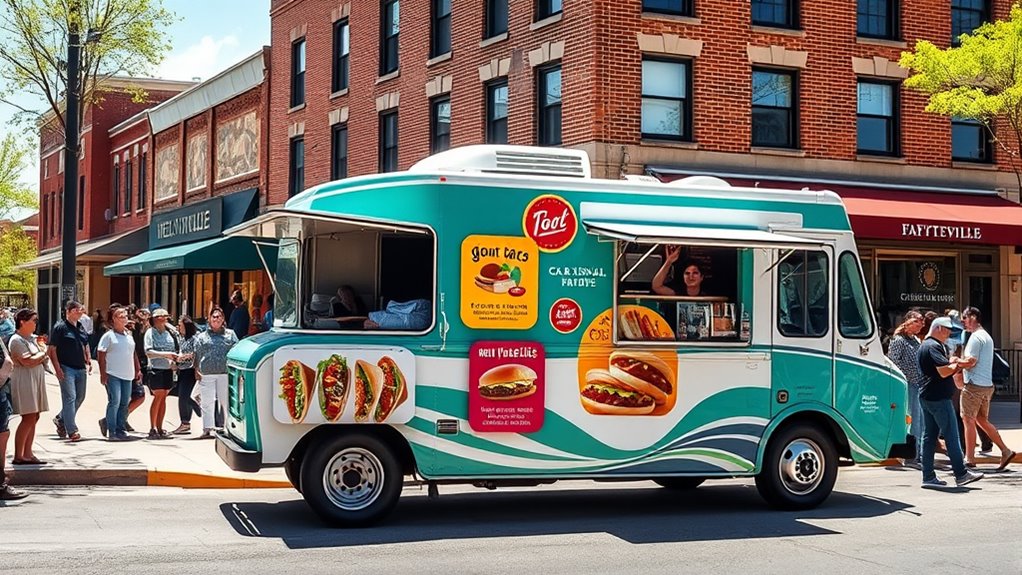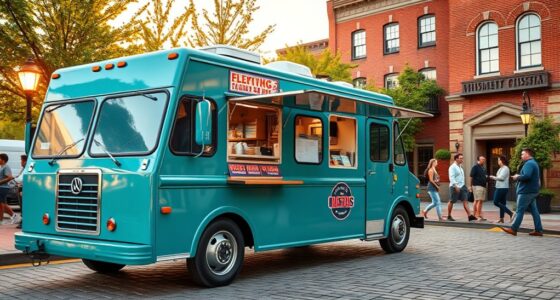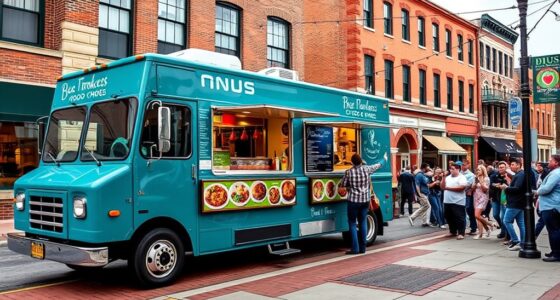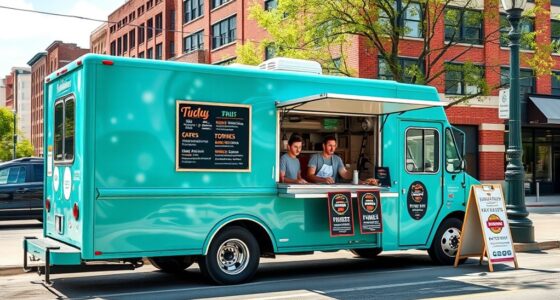To start a food truck in Fayetteville, Arkansas, you’ll need permits like a $100 zoning permit and an Arkansas health permit costing $35 annually. Budget around $50,000 to $150,000 for your truck and equipment. Find prime spots with high foot traffic, ensuring proper zoning and permission. Develop a compliant menu and focus on food safety certifications for your staff. For details on permits, costs, and location tips, keep exploring these key steps.
Key Takeaways
- Obtain necessary permits from Fayetteville ($100) and Arkansas Department of Health, including menu approval and safety inspections.
- Startup costs range from $50,000 to $150,000 for truck purchase, equipment, and licensing, with ongoing expenses for fuel and maintenance.
- Choose high-foot-traffic, properly zoned private or public locations, adhering to parking and stay time restrictions.
- Develop a compliant menu emphasizing quick, safe-to-prepare foods, and ensure staff certification in food safety protocols.
- Engage customers through branding, loyalty programs, digital marketing, and community presence to build long-term success.
Navigating Permit Requirements and Application Procedures
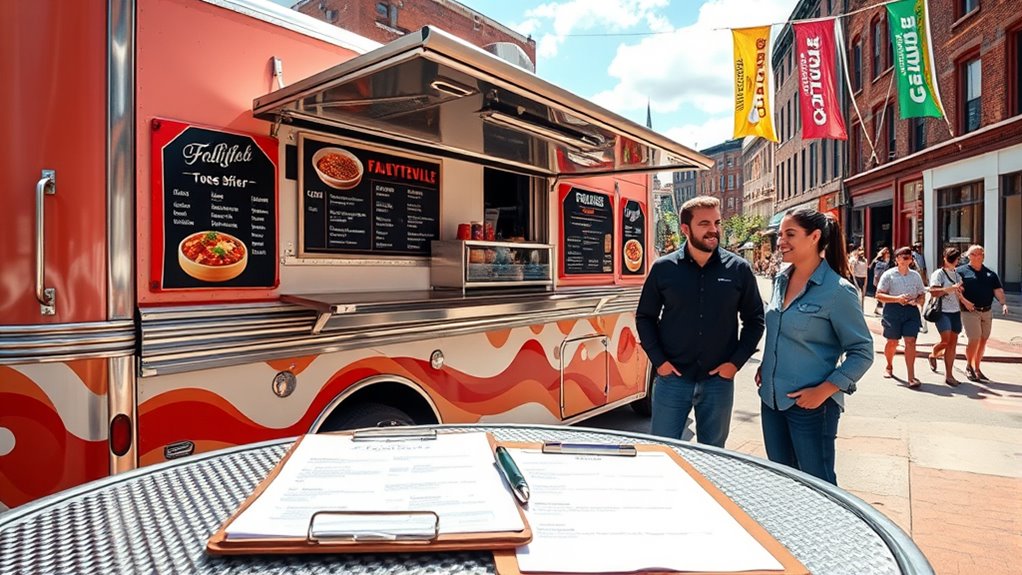
Understanding the permit requirements and application procedures for operating a food truck in Fayetteville, Arkansas, involves understanding several key steps. First, you need to secure the city’s food truck permit, which costs $100 and confirms zoning and code compliance. You’ll also need an Arkansas Department of Health (ADH) permit if your food requires temperature control, with an initial plan review and a $35 annual fee. Providing a detailed menu, photos of your truck, and proof of health permits is essential. You must also pass a Fire Marshal inspection for safety equipment like fire extinguishers and secured fuel tanks. Additionally, submitting a Hospitality Tax Remittance form to the city is necessary. Be prepared to share your kitchen plan, SOPs, and plumbing details for approval, ensuring compliance before opening. Applying for all necessary permits in advance helps prevent delays and ensures smooth operation once your food truck is ready to serve. Furthermore, understanding local regulations and compliance requirements is crucial to avoid penalties and ensure your business operates legally.
Estimating Startup Costs and Budgeting Effectively

Estimating startup costs for a food truck in Fayetteville, Arkansas, is a crucial step to guarantee your business is financially prepared. Expect initial expenses to range from about $50,000 to $150,000, depending on truck condition, customization, and niche. The largest upfront cost is purchasing or leasing the truck, which can be $20,000 to $100,000. You’ll also need to budget for kitchen equipment installation, adding several thousand dollars to meet safety standards. Licensing and permits typically cost between $50 and $150, with insurance premiums around $1,000 to $2,000 annually. Don’t forget recurring costs like fuel, maintenance, inventory, and marketing. Developing a detailed, conservative budget helps manage costs and ensures you have funds set aside for unexpected expenses, setting a strong foundation for your food truck venture. Proper budgeting is essential to avoid financial pitfalls and ensure sustainable growth for your business. Additionally, considering the initial investment in high-quality equipment and vehicle customization can significantly impact your operational efficiency and long-term success.
Identifying Prime Operating Spots and Location Restrictions
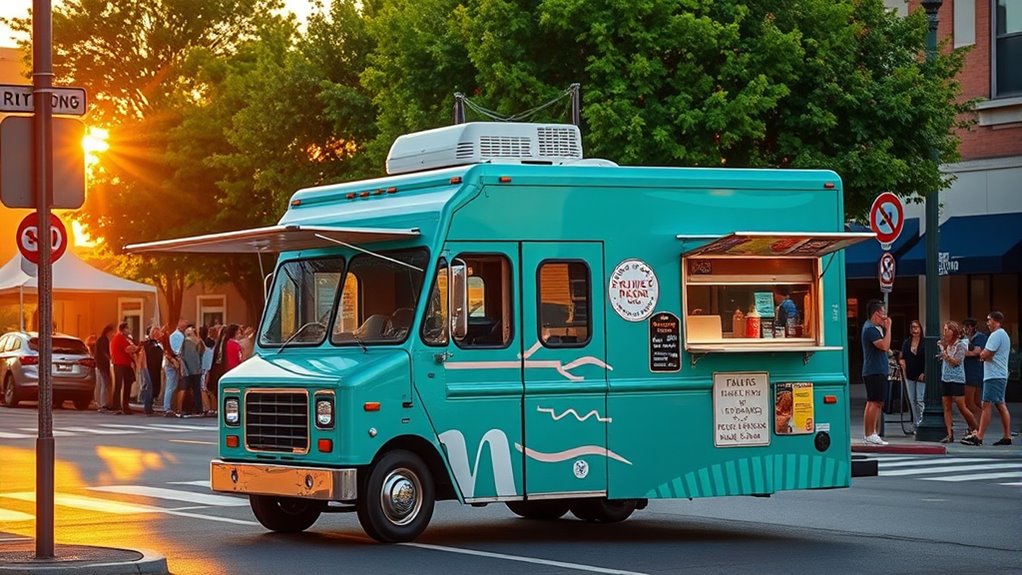
To find the best spots for your food truck, you need to understand parking space regulations and get proper permissions for private property. Without approval, you risk fines or having to relocate, which can hurt your business. Make sure you’re clear on local rules to keep your operation smooth and compliant. There are over 4 unique taco trucks and carts available in Fayetteville, so exploring different locations can help you find the most successful spot for your menu.
Parking Space Regulations
Selecting the right parking spots is essential for operating a food truck in Fayetteville. You can park in marked parallel spaces not reserved for residential use, but avoid parking directly in front of businesses selling similar food to prevent competition. Always sell food on the sidewalk side of your truck to ensure pedestrian safety. Parking in city parks is allowed with proper approval, but spaces near pay stations and angled on-street spots are off-limits. You’re limited to four hours per location and must move at least 325 feet away afterward. Your truck must fit completely within marked boundaries, and you should avoid blocking entrances, fire hydrants, or ramps. Stay clear of the Downtown and Entertainment Districts, respecting zoning and safety regulations at all times. Vendors can stay on private property for up to six months with a permit, which can influence your choice of location for long-term operations.
Private Property Permissions
Operating on private property in Fayetteville offers a strategic advantage for food truck vendors, but it requires careful attention to zoning laws and permissions. You must verify the property is zoned for food and beverage sales and obtain the owner’s permission. A city planning permit is needed for temporary operation, allowing up to six months at a single location; beyond that, you either need to move at least a quarter mile or apply for an annual permit. Be mindful of restrictions on adjacent businesses—your truck can’t directly compete with nearby permanent food establishments on the same side of the street. Prime spots are on parcels with high foot traffic, outdoor space, and suitable zoning. Proper permits and location evaluation are essential to operate legally and maximize sales. Additionally, understanding local zoning regulations related to zoning compliance ensures that your food truck remains in legal operation and avoids potential fines or shutdowns.
Crafting a Menu That Appeals and Complies
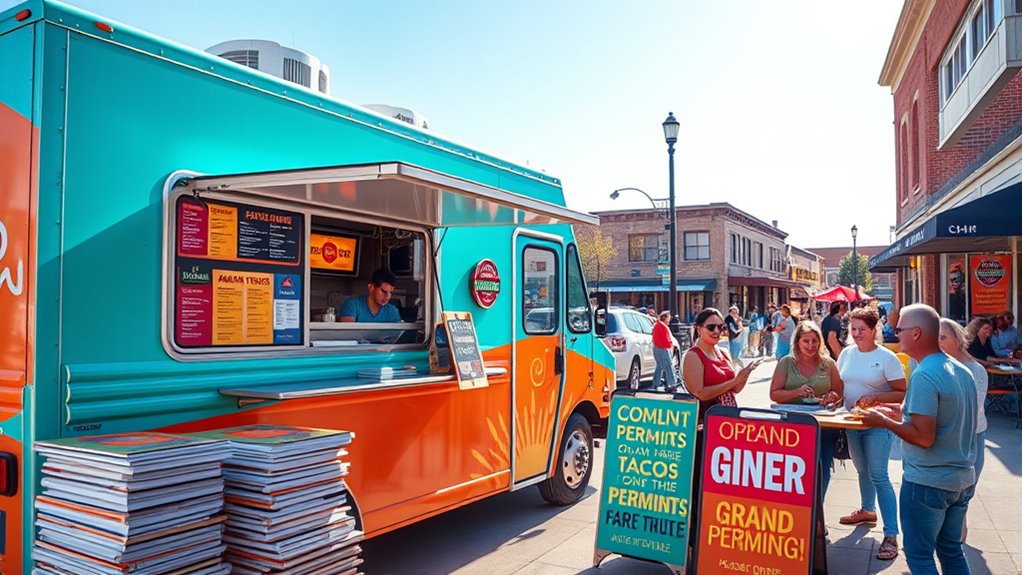
Crafting a menu that appeals and complies requires balancing customer preferences with strict food safety regulations. To succeed, focus on these key points:
Design a menu that balances customer appeal with strict food safety compliance through simplicity, quality, and regular updates.
- Select easy-to-prepare items that fit your limited space and resources, ensuring quick service.
- Use SOPs to maintain consistent food prep, hygiene, and equipment use, meeting Arkansas Department of Health standards. Implementing standard operating procedures can help ensure compliance and efficiency.
- Incorporate fresh, high-quality ingredients, highlighting sourcing and food origins to build trust.
- Regularly update your menu based on customer feedback and seasonal ingredients to keep it appealing and compliant. Additionally, conducting market research and consumer surveys can help identify popular items and inform menu decisions. Market research can ensure your offerings meet local tastes while staying within regulatory guidelines.
Developing a Marketing Strategy to Grow Your Brand
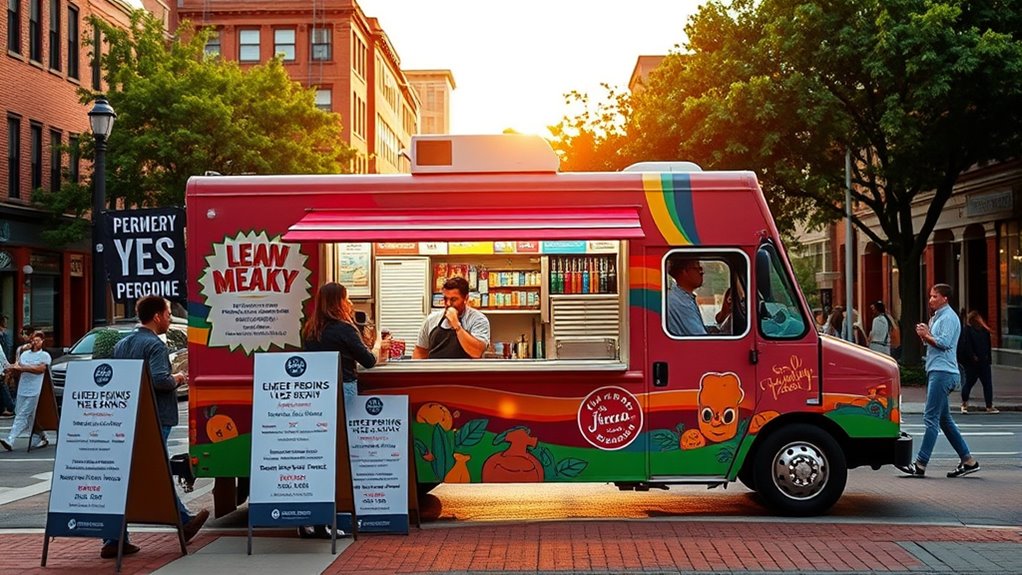
A well-planned marketing strategy is essential for growing your food truck’s brand and increasing sales. Leverage social media, especially Facebook, which 75% of food trucks use to announce events and engage customers. Campaigns on social platforms boost sales by at least 20%, offering strong ROI. Mobile apps that track trucks have grown 35%, making it easier for customers to find you and return. Participating in local events and festivals—used by 80% of trucks—drives foot traffic and builds community loyalty. Building customer loyalty programs, which over half of trucks use, can increase visit frequency by 30%. Utilize data analytics and GPS tracking to optimize marketing efforts, identify peak times, and target key demographics like millennials. Customer engagement and loyalty programs Combining these strategies maximizes exposure and accelerates your brand growth, especially when considering how privacy and consent management can enhance trust with your audience.
Ensuring Food Safety and Staff Certification Standards
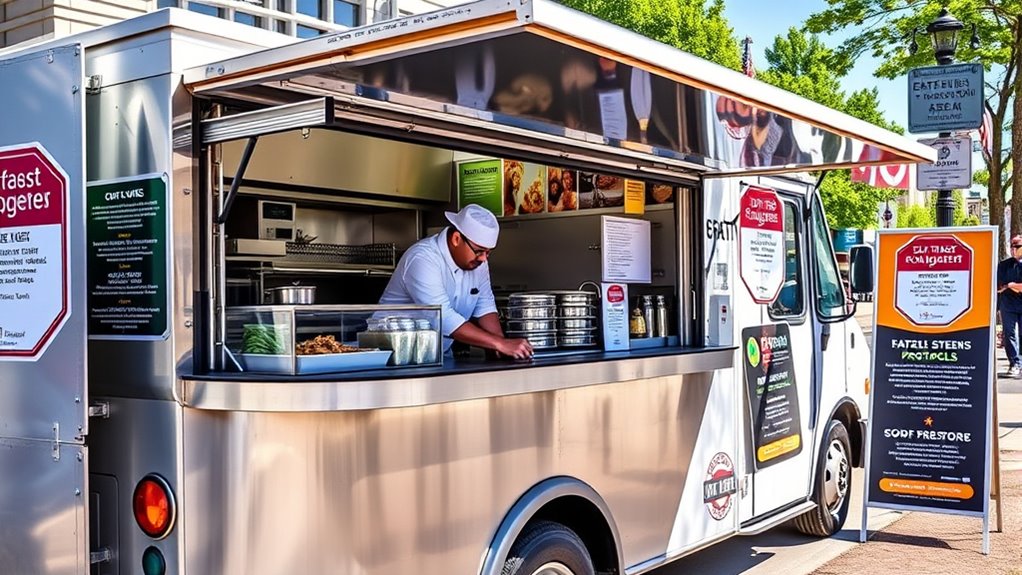
To keep your food truck compliant, you need to guarantee all staff have proper food safety certifications and follow strict protocols. Proper training helps prevent contamination and maintains high sanitation standards. Staying current with these requirements protects your customers and keeps your operation running smoothly. Regularly updating your knowledge on food safety standards ensures your team remains informed about the latest best practices and regulations.
Staff Certification Requirements
Are you knowledgeable about the certification requirements necessary to guarantee food safety on a Fayetteville food truck? Arkansas mandates specific staff certifications to ensure safe food handling. Here’s what you need to know:
- Food Handlers: Complete a 2-hour state-approved training course and pass an exam to earn a Food Handler’s Certificate. This applies to all staff handling or serving food, including servers, cooks, and cashiers. Food Handler Certification ensures compliance with state regulations and enhances food safety practices.
- Food Managers: At least one person must have a Certified Food Manager (CFM) credential, obtained through an ANSI-accredited course and exam, with a validity of five years.
- Staff Roles: Managers, owners, and chefs typically need CFM certification, while other staff require the Food Handler Certificate.
- Recertification: Both certificates require renewal through refresher training or retesting every five years to stay compliant.
Food Safety Protocols
Ensuring food safety on your Fayetteville food truck requires strict adherence to established protocols that protect customers and meet regulatory standards. You need written SOPs covering food handling, staff hygiene, equipment use, and cleaning routines. These should align with Arkansas Department of Health (ADH) rules for plumbing, water tanks, and handwashing stations. Proper wastewater disposal and storage of dry goods are essential. Regularly sanitize all food contact surfaces and equipment to prevent contamination. Maintain proper temperature controls by monitoring cooking, cooling, and reheating with calibrated thermometers. Separate raw and cooked foods during storage and prep to avoid cross-contamination. Keep detailed records of inspections, cleaning, and temperature logs to stay compliant. Implement pest control measures and enforce strict hygiene policies among staff to ensure food safety. Incorporating water safety protocols is also crucial to prevent issues related to water quality and sanitation.
Frequently Asked Questions
How Long Does It Typically Take to Get All Necessary Permits Approved?
Getting all your permits approved usually takes around 4 to 6 weeks. You’ll need to navigate multiple steps, including zoning, health, and fire safety approvals. To accelerate things, submit a complete application with all required documents and engage early with inspectors. Keep communication open and respond promptly to any requests. Planning ahead and staying organized helps ensure you meet your launch timeline without unnecessary delays.
Are There Any Specific Zoning Restrictions for Mobile Food Trucks?
They say “know the rules before you start,” and zoning restrictions are key. You can’t park within 10 feet of a structure if your truck has a fuel-burning appliance, nor in angled on-street or public parking spots in entertainment districts. You also can’t block sidewalks or park in residential reserved spaces. Keep your location within permitted zones, move every four hours, and always follow Fayetteville’s zoning code to stay compliant.
What Insurance Requirements Are Mandatory for Food Truck Operation in Fayetteville?
You need to meet several insurance requirements to operate your food truck in Fayetteville. Make certain you have commercial auto insurance covering liability, collision, and all-encompassing coverage for your vehicle and trailer. Additionally, obtain general liability and food liability insurance to protect against customer claims. Workers’ compensation is mandatory if you have employees, and property insurance covers your equipment. These steps guarantee you’re compliant and protected during your food truck journey.
Can I Operate My Food Truck at Multiple Locations Daily?
Yes, you can operate your food truck at multiple locations daily in Fayetteville. You need to move within 12 hours and make certain you’re out of view from the original spot. Make sure to get permission for private property, avoid restricted parking areas, and follow city rules on location and safety. Coordinate with the Fayetteville Parking Management Division, and remember, you must have the proper permits and licenses for each site.
Are There Any Local Events or Festivals That Offer Special Vending Permits?
Surprisingly, Fayetteville’s events seem to hand out permits like candy at festivals. You’ll find special vending permits for big events like the Strawberry Festival, International Festival, and Brew Pig Sooie, often easier and cheaper than regular licenses. Just remember, you’ll need to plan ahead, show proof of insurance, and follow health rules. So, if you want to vend at these festivals, get ready to jump through a few hoops—and enjoy the crowds!
Conclusion
So, after all that planning, permits, and location scouting, you might think success is just a matter of flipping your sign. But don’t forget—your perfectly crafted menu and marketing magic are what truly keep customers coming back. Irony’s served: even with every box checked, it’s your passion and persistence, not just the permits, that turn your food truck dream into a lasting reality. Now, go out there and make it happen!
